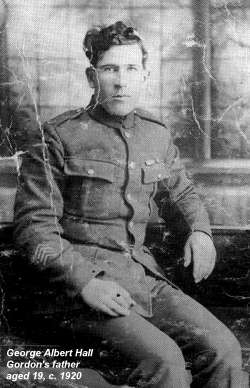
In March 1991, Gordon Hall went into the BBC Radio Sussex studios in Brighton to talk to Vic Smith and to record some songs for the programme, ‘Minstrels Gallery’. Included in that interview was the following relating to his father George Albert Hall.
You know, I can see those boys, I can see my Uncle Fred, you know, being captured. One of only 38 men that were captured out of the Sussex Regiment that the Germans called ‘The Iron Regiment.’ Only 38 of them. Now if that’s not a personification of the ‘We Won’t Be Druv’ which Sussex is all about. They got killed in their thousands – 1,723 of them from the 2nd Regiment alone. That was my uncle’s and my father’s regiment. It’s just incredible to think that there they were. They had that stoicism in spite of what was thrown at them. And, not to put too fine a point on it, they were very badly led and they weren’t that well kitted out. You could argue that this was the first modern war of its kind. The first modern war, but it infuriates me to think that perhaps, if circumstances had been slightly different, many of those poor souls that died would have come back to us.
So, if your father was in a Sussex regiment, had the family moved back to Sussex or had he joined the Sussex Regiment in London?
Well, what in fact happened, and it’s quite an unusual story … My father was in the army at the age of 14. I think he was wounded before he was 15 years of age. And then, as a result of his other brothers – he was from a fair-sized family – my uncle Bill, I believe he was an early despatch rider, and somewhere or other he came across his younger brother, who, as in the words of the song, he thought was safe back home. Well, he made it his business to see that Dad was sent safe back home.
So then Dad waited until he was 16 years of age. I beg your pardon, I should have said that at 14 he joined one of the Lancer Regiments. And to the day that he died he talked about the screams of the horses as they were cut to pieces by shrapnel. That was something that was burned into his memory. Anyway, he then rejoined the army at the age of 16, this time in the Sussex Regiment, and he served alongside other people, for example, my Uncle Fred, Mum’s brother, the next one up in the family from Mum. They was from a big family, but mainly girls, just two sons: Uncle Fred, slightly older than Mum, he died fairly recently, he was well into his eighties, and Uncle Will, who was killed on a motorbike on Clayton Hill about 1926. I’ve never been able to confirm that, but that’s the family story.
So Dad was in the Sussex in the second battalion, of course, it was a terrible business. You would not believe this, but at the time when my father … we always had a huge table because there was a crowd of us … at a certain time of an evening, my father would adjust his chair at the head of a big old refectory table, because he dealt in furniture, to a certain angle and you knew then that we were going to be on the receiving end of all those, wonderful to us, war stories. Obviously, after a while, you could have told the stories in exactly the way that Dad was telling it, except that he was a wonderful raconteur, me father, arguably the finest teller of a story that I have ever heard in my life. Now, when I say that, I don’t want you to get the impression that he changed his dialect or his accent. He was always the loveable Cockney. That’s the way he was made. But he had a feel for language. He could make himself understood in any company without altering his accent and, I mean, you lived through it with him. If Dad talked about, in his rather colourful language, when they retreated from wherever, we’ll say Mons: ‘There we were, the rags of our arse flogging us to death.’
And they put the regimental band in front of them. Well, of course, by this time the lift that you are supposed to get from the regimental music that conjures up the Jingoism or whatever, they’d got over that, you know, and in fact they used to sing Sussex By The Sea which was their regimental march.
Nothing against the people in Sussex, except that they knew that nobody over here, be it in Sussex or in any other county, knew what was going on at the Front.
You know, girls were walking about giving people white feathers, weren’t they? That kind of thing. They had no idea of the hell it was. No idea at all. And of course, there it was.






